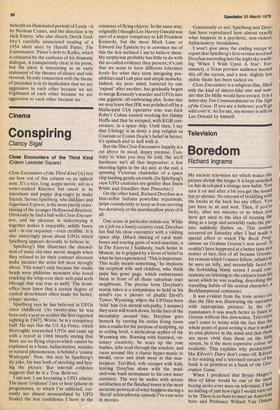Television
Boredom
Richard Ingrams
My ancient television set which makes the picture shrink the longer it is kept switched on has developed a strange new habit. You turn it on and after a bit you get the sound but no picture. No amount of twiddling with the knobs at the back has any effect. You just have to sit and wait. Then, if you're lucky, after ten minutes or so when you have got used to the idea of treating the thing as a large and unwieldy radio the picture suddenly flashes on. This routine occurred on Saturday after I had made a special effort to watch The Book Programme on Graham Greene's new novel. It couldn't have happened at a better time as 3 matter of fact, first of all because Greene, for reasons which I cannot follow, refuses to be seen on telly, and meanwhile faced bY the forbidding blank screen I could concentrate on listening to the extracts from his novel which he was reading, describing the travelling habits of his central character, Berkhampstead commuter. It was evident from the train noises etc that the film was illustrating the narrativ. e with appropriate pictures. In the cif' cumstances it was much better to listen to Greene without this distraction. Television can't come to terms with the fact that the whole point of good writing is that it makes its own pictures in the mind and that these are more vivid than those on the little screen, be it the most expensive colour set available. This explains why productions like Kilvert's Diary don't come off. Kilvet.t is for reading and a televised version of lus book is as pointless as a book of the Gen" eration Game. When I predicted that Bryan Magee's Men of Ideas would be one of the nut boring series ever seen on television, I tutu no inkling of just how right I would turn .out to be. There is no bore to meet an American bore and Professor Willard Van Ormau


































 Previous page
Previous page